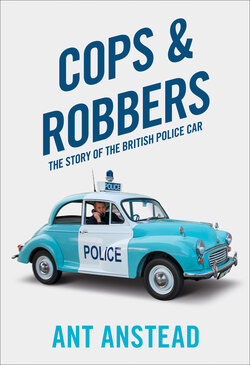Читать книгу Cops and Robbers - Ant Anstead - Страница 9
CHAPTER TWO THESE DEVILISH MACHINES SCARE THE HORSES, YOU KNOW
ОглавлениеOn Monday 20 January 1896, Mr Walter Arnold, who worked for his family’s agricultural machine-engineering concern in East Peckham, Kent, was driving along the Maidstone Road through the neighbouring village of Paddock Wood at an estimated 8mph, 4mph or so below the maximum speed of the ‘Arnold Motor Carriage Sociable’ (a Benz copy produced under licence) that he was driving. Local constable J.C. Heard, of the Kent County Constabulary, saw this outrageous behaviour from the front garden of his cottage and set off in hot pursuit on a single-speed bicycle. In that one moment the relationship between the UK police and the motorist was, partially at least, set.
The speed limit in the area was a mere 2mph, so Arnold was thus exceeding it fourfold – although how Constable Heard measured this accurately enough to definitely state this is, of course, unknown. Arnold was chased (on the bicycle) and eventually caught by the presumably quite fit local bobbie after a five-mile pursuit! It is recorded, with some understatement I suspect, that Constable Heard had to pedal at his hardest for quite some time (at 8mph that’s just under 40 minutes’ pedalling time) before catching the unfortunate Mr Arnold. Arnold was charged with four offences; three pertaining to the Locomotives Act and one offence of speeding. The case went to trial, and although Arnold’s barrister, a Mr Cripps, argued that the law shouldn’t apply to the new lightweight ‘autocars’ and that Arnold had a carriage licence (a system designed for horse-drawn carriages), Arnold was found guilty on all counts and ordered to pay a total fine of £4 6 shillings, of which only a 1 shilling fine and 9 shilling costs was for the speeding offence. When you take into account that his car sold for £130, this fine seems quite paltry, but remember that cars back then were a luxury, and the average weekly wage was less than £1 for a 56-hour working week.
Arnold was not only the first motorist fined for speeding in the UK, but it is believed that he was the first person in the world to claim this dubious honour. The car as a concept was young, and, much like laws surrounding the internet in the early twenty-first century, the legislators took some time to draft new laws that applied to these vehicles. Some eminent politicians of the time even felt it wasn’t worth the bother, as they deemed that these horseless carriages were bound to be just a phase, the attitude being that they would be short-lived as they frightened the horses for goodness sake!
Arnold probably wasn’t too unhappy with the publicity that his case generated, because he was in fact one of the country’s first car manufacturers and dealers. His career began by selling new, imported Benz cars from Germany, then between 1896 and 1899 he manufactured a licensed copy of the Benz called the Arnold Motor Carriage. At this point demand for these newfangled machines was high and Arnold is quoted as saying in a newspaper report towards the end of 1896 that, ‘if we had twenty in stock they could be disposed of in a week’. No documents exist hinting in any way that he deliberately drove through Kent intending to get caught, but you have to wonder, don’t you? If he did do it deliberately he was a marketing genius and well ahead of his time. He apparently sped past the Constable’s house, and as a local himself he would surely have known where the local bobbie lived. If he did get caught deliberately, he exhibited an understanding of the media and the gentle art of car marketing at least fifty years ahead of his time – secretly, I kind of hope he knew exactly what he was doing, and thus Arnold placed down a permanent marker for all car sales people to follow. Take a bow, my man.
Arnold kept a scrapbook of press cuttings about his cars and their exploits that still belongs to the owner of the very car that he was driving when he was apprehended, so it’s a real possibility that this was a deliberate act. Having said that, that scrapbook also shows that he and other family members committed similar offences at least twice more, so perhaps they just considered this the price paid for the freedom to ‘motor’ at will. This was certainly the prevailing wisdom among motoring pioneers of the time, and the pages of the first editions of The Autocar (which began circulation in 1895) are full of motorists testing the judicial system in one way or another, using their new machines. Newspapers also picked up on this, carrying drawings of ‘future townscapes’ showing horseless carriages and stating that science had made this possible but the law was preventing it happening.
